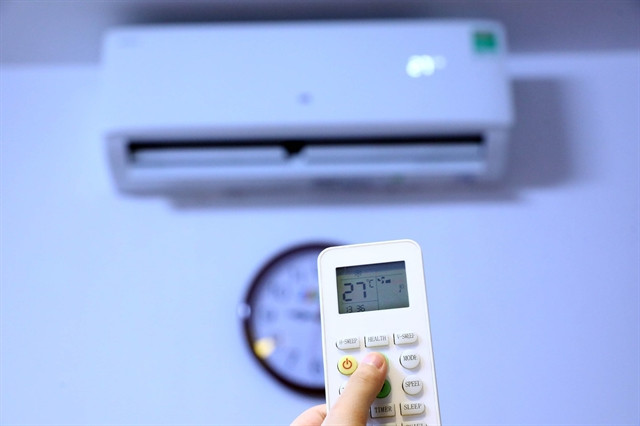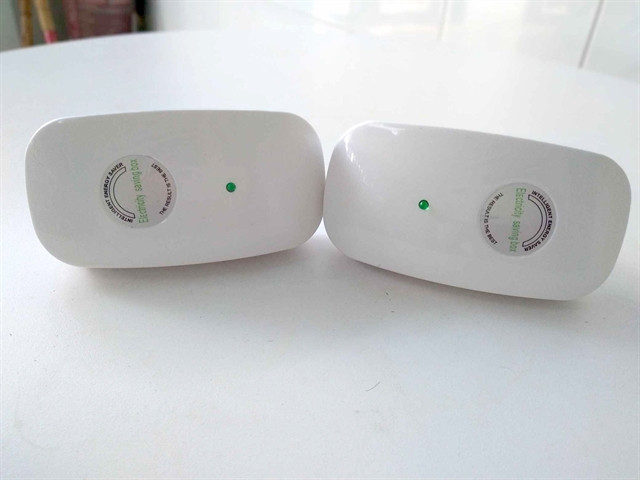 |
| The small-sized "energy-saving" equipment is claimed to optimise the capacity of the main appliances in the household, such as air conditioners or refrigerators. — VNA/VNS Photo |
As people and businesses across the country try to save energy due to power shortages, advertisements for devices that claim to reduce nearly half of a household’s usual electricity consumption are rampant on the Internet but their effectiveness remains questionable.
It is easy to find advertising posts selling energy-saving equipment on social networking and e-commerce platforms that are said to reduce up to 40 per cent of electricity bills per month, and that the seller will refund in full if the devices are inefficient.
In addition to saving electricity, some devices are supposed to prevent lightning strikes, helping ensure the safety of the whole family's electrical system.
The user instructions is to simply plug the device into any electrical outlet in the house, preferably near appliances that use large capacity and are constantly in operation such as air conditioners or refrigerators.
This small-sized additional equipment will then optimise the capacity of the main appliances, said the sellers.
Advertisers added that the principle of these energy-saving devices is based on harmonic filtering, thereby, reducing power loss.
Consumers can easily feel lost in the "matrix" of energy-saving products, with numerous different models, types, and origins. The selling price of these products ranges from a few hundred thousand to a million Vietnamese đồng each.
In the hope of reducing the amount of electricity use and cost during the summer, many people have bought the product.
 |
| A model of the "electricity saving boxes" that are being sold on the Internet. — Photo vtc.vn |
Nguyễn Danh T., a customer in Đống Đa District, Hà Nội, said that the result disappointed him.
“The first month I thought it was to save electricity, but the bills increased the next month.
“I called to ask the sellers and they still even insist that their equipment can save energy,” he told VTC News.
Trần Trọng Tráng, an industrial and civil electrical engineer in Hà Đông District, also bought one of the “energy-saving” devices to test out for himself and confirmed that it has no use in saving electricity as advertised.
He said: “Inside the device are only a simple circuit, a capacitor, and eight resistors, a current compression diode for the red indicator light on the device.
“With this simple device, I’m certain that it does not have the ability to save electricity.
“People should consult with information from research units or customer care services of electricity companies to avoid losing money for falsely-advertised devices.”
Not as advertised
In the face of the boom in so-called energy-saving devices, Vietnam Electricity (EVN) has issued a warning to consumers against these products.
"These devices’ energy-saving ability is not certified by the Ministry of Science and Technology, the Ministry of Industry and Trade, or reputable specialised units in energy-saving in the market for their power-saving efficiency as advertised.
An experiment was carried out by the Central Power Electronics Measurement Equipment Manufacturing Centre and the Central Power Corporation’s Electricity Purchase Supervisory Board on the “electricity saving box” sold on the market.
EVN said in an announcement on its official website: “After the experiment, the device when used can reduce the magnitude of the current through the load, but cannot reduce the amount of power consumed, leading to an increase in power consumption.”
The equipment has been falsely advertised for sale and deceiving customers, the announcement said.
Potential harm
According to Dr Trần Văn Thịnh, former head of the Electrical Engineering Department at Hanoi University of Science and Technology, these devices use compensation capacitors, which are prone to overheating, short circuits and explosions.
These devices can damage household electrical equipment by making the current unstable.
If there is equipment that can directly interfere and cause the electric metre to slow down, it also means that the person using the device is violating regulations on electricity use and can be subjected to penalties according to the laws.
Dr Nguyễn Bách Phúc, head of the Electric, Electronics and Informatics Institute in HCM City said that this device can save energy at a minuscule level, having virtually no effect on the household’s electricity system.
He said: “The best thing to do is to not waste money on these devices, because it has no use in saving energy and can even potentially damage the electric system.” — VNS